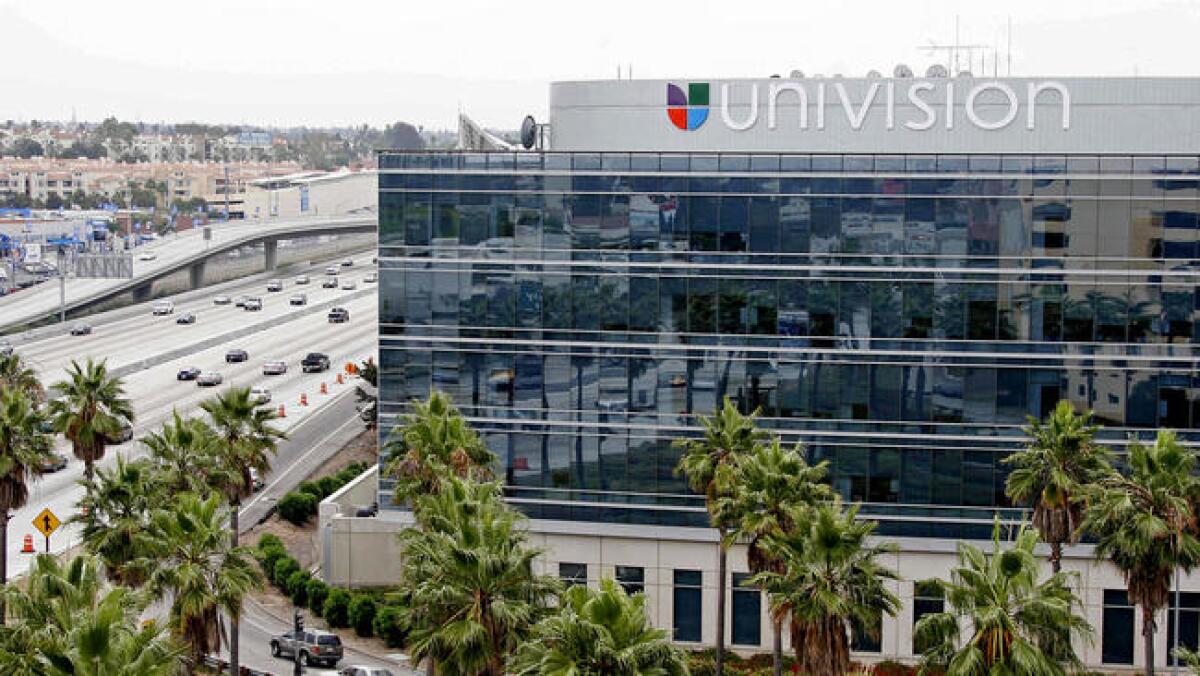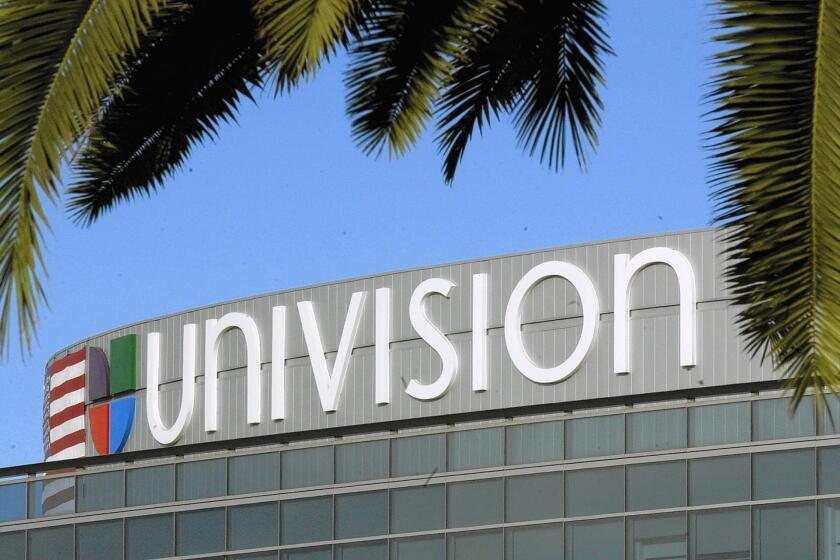Spanish-language media giants Univision and Televisa to merge

Univision Communications and Grupo Televisa plan to merge their entertainment assets to create a powerful new Spanish-language media company with one foot in the United States and the other in Mexico.
The companies jointly announced the move late Tuesday, formalizing a process that began quietly after Univision came under new ownership late last year. The historic merger represents a dramatic retrenchment for media scion Emilio Azcárraga Jean, whose family has long been among Mexico’s powerbrokers because of its ownership of Televisa and its vast media holdings.
The new entity, which will be known as Televisa-Univision, will be the world’s largest Spanish-language media company. It will be managed by Univision Chief Executive Wade Davis, a former top Viacom executive who put together the investor group that purchased Univision late last year from a consortium of U.S. private equity firms. The Televisa deal is expected to close later this year.
The union is designed to position Televisa-Univision as a global force in streaming.
“Looking at the overall market, there has never been a truly global Spanish-language media company,” Davis said in an interview. “Even Televisa and Univision ... were relegated to their respective [geographic] regions, which is kind of breathtaking when you think about the size of the global Spanish-language audience and marketplace.”
While not the powerhouse it used to be, Spanish-language media giant Univision continues to reach an important demographic: Latinos.
By parlaying Televisa’s worldwide name recognition and enormous vault of Spanish-language programming, Univision hopes to turbocharge its streaming efforts in the U.S. and Mexico — and abroad.
The deal borrows from the playbook of Walt Disney Co., which two years ago acquired much of Rupert Murdoch’s 21st Century Fox entertainment holdings for $71 billion. Disney bet big to bulk up on programming, and gain the majority stake in the Hulu streaming service, so it could take on Netflix around the world.
The Televisa-Univision combination underscores pressures facing both companies.
In Mexico, Televisa has struggled to adapt to the streaming era and has lost some of its audience to Netflix. Although the company produced more than 86,000 hours of content last year, its signature telenovelas haven’t connected with young audiences as they did decades ago. The company does have valuable rights to sports and special events and produces news, movies, reality shows, children’s programs and educational programming.
Miami-based Univision, which has long relied heavily on Televisa’s low-cost telenovelas to fill its prime-time schedule, also faces increased competition from Telemundo, which is owned by NBCUniversal, as well as English-language channels, YouTube and streaming services.
Univision has long been tethered to Televisa through a long-term programming rights agreement. The pact provided Univision access to inexpensive shows from Mexico, giving the company little incentive to create its own scripted programming. However, lacking the rights to its programming became a liability for Univision in the streaming age.
Televisa, based in Mexico City, will retain 45% interest in the new entity.
“Combining with Univision has always been a dream for us. This has always been the ultimate goal, and we finally accomplished it,” Televisa co-CEO Alfonso de Angoitia said in an interview. “Univision and Televisa have been partners on and off for decades. It was the right moment, and the right people to do it with.”
During the 14 years Univision was controlled by Los Angeles billionaire Haim Saban and other private equity investors, the company battled Televisa over the rights to the programming and squandered its leadership position in the U.S. Spanish-language market after a failed foray into English-language programming.
“The merger facilitates an effective move to streaming by combining content, production facilities, substantive operational cost savings and owned distribution outlets in the two largest Spanish-speaking markets in the world,” media consultant Julio Rumbaut said. “At the same time, it reinforces the strength of the traditional media assets of both companies.”
Televisa said it would contribute its four broadcast TV channels, 27 pay-TV networks, Videocine movie studio and Blim TV subscription video-on-demand service, as well as the iconic Televisa trademark.
Univision will add its Univision and UniMás broadcast networks, nine Spanish-language cable networks, 61 television stations and 58 radio stations in the U.S. and Puerto Rico, along with its recently launched streaming service PrendeTV. Its management team will be in charge.
“By combining the assets that the respective companies have — the rights profile, the libraries and the [intellectual property] in the two largest Spanish-speaking markets in the world — you really have something incredibly special,” Davis said.
Televisa valued its assets at $4.8 billion.
Univision will pay Televisa $3 billion in cash and provide $750 million in Univision common equity and $750 million in Series B preferred equity.
The transaction was partially financed by a $1-billion investment series led by the SoftBank Latin America Fund with participation from Google, Raine Group and Davis’ firm, ForgeLight, and $2.1 billion of debt commitments arranged by J.P. Morgan.
The combined company, which will be based in the U.S., is expected to produce revenue of about $4 billion a year and $1.6 billion in earnings before interest, taxes, depreciation and amortization, De Angoitia said. The new firm will have about 13,000 employees and will continue to rely heavily on its production facilities in Mexico City.
Televisa will retain ownership of Izzi Telecom, Sky and other businesses and real estate associated with the Mexico production facilities. It will also maintain the Mexican government-issued broadcasting licenses and its transmission infrastructure in Mexico.
When the deal is completed, the Azcárraga family will relinquish its controlling stake — but the family will gain a significant piece of a U.S.-based company. Emilio Azcárraga Jean’s grandfather co-founded Univision 60 years ago with a single TV station in San Antonio, and his father built Televisa into an entertainment and political juggernaut in Mexico.
“This strategic combination generates significant value for shareholders of both companies and will allow us to more efficiently reach all Spanish-language audiences with more of our programming,” Azcárraga Jean, executive chairman of the Televisa board of directors, said in a statement. “Together, Televisa-Univision can more aggressively pursue innovation and growth through digital platforms as the industry continues to evolve.”
More to Read
Inside the business of entertainment
The Wide Shot brings you news, analysis and insights on everything from streaming wars to production — and what it all means for the future.
You may occasionally receive promotional content from the Los Angeles Times.








